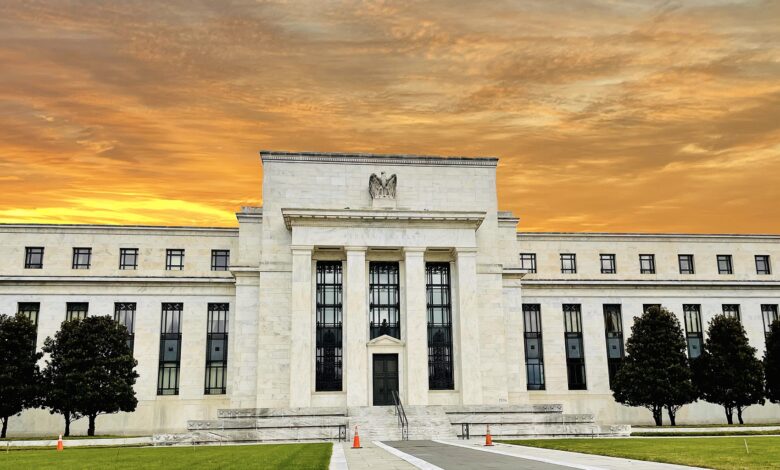Investors adjusted positions before the Fed’s decision, with gold prices reaching near 3,685, as the U.S. struck Venezuelan vessels again.

In the early Asian trading session on Tuesday (September 16, Beijing time), spot gold was trading near $3,680 per ounce. Gold prices hit a new all-time high of $3,685.47 per ounce on Monday, supported by a weaker US dollar and falling US Treasury yields, as investors adjusted their positions ahead of the Federal Reserve’s key meeting this week, which could set the tone for the rest of the year. Meanwhile, US crude oil traded around $63.32 per barrel, with oil prices climbing amid reports of a drone attack by Ukraine on a Russian refinery and pressure from former US President Donald Trump urging NATO countries to stop purchasing Russian oil.
Key Focus of the Day

Stock Market
The three major US stock indexes closed higher on Monday, with the S&P 500 and Nasdaq Composite both hitting intraday record highs, as investors awaited the Federal Reserve’s crucial policy meeting later this week.
Tesla Inc., the electric vehicle manufacturer, saw its shares rise by 3.6% after regulatory filings revealed that CEO Elon Musk purchased nearly $1 billion worth of additional company stock last Friday. Alphabet Inc., Google’s parent company, reached a new all-time high, surpassing a market capitalization of $3 trillion.
 The Federal Open Market Committee (FOMC) of the Federal Reserve will convene a meeting on September 16-17, setting the tone for market sentiment this week. Recent economic data has shown weakness in the labor market, leading to widespread expectations that the Fed will cut interest rates by 25 basis points. Carol Schleif, Chief Investment Officer at BMO Family Office, stated: “The market is betting on a ‘Goldilocks’ scenario where the labor market is just weak enough to prompt the Fed to initiate a series of rate cuts without undermining overall economic growth. I believe the market would be disappointed if the Fed does not signal further rate cuts.” On Monday, traders priced in a 96% probability of a 25-basis-point rate cut at this week’s meeting.
The Federal Open Market Committee (FOMC) of the Federal Reserve will convene a meeting on September 16-17, setting the tone for market sentiment this week. Recent economic data has shown weakness in the labor market, leading to widespread expectations that the Fed will cut interest rates by 25 basis points. Carol Schleif, Chief Investment Officer at BMO Family Office, stated: “The market is betting on a ‘Goldilocks’ scenario where the labor market is just weak enough to prompt the Fed to initiate a series of rate cuts without undermining overall economic growth. I believe the market would be disappointed if the Fed does not signal further rate cuts.” On Monday, traders priced in a 96% probability of a 25-basis-point rate cut at this week’s meeting.
Tesla’s rally pushed the S&P 500 Consumer Discretionary sector up by 1.1%, marking its highest level in nearly nine months. Meanwhile, Alphabet drove the Communication Services sector higher by 2.33%.
The Dow Jones Industrial Average rose by 0.11% to close at 45,883.45 points, while the S&P 500 Index gained 0.47% to reach 6,615.28 points, and the Nasdaq Composite advanced by 0.94% to finish at 22,348.75 points.
All three major Wall Street indexes ended the previous trading session with weekly gains, with the Nasdaq and S&P 500 hitting intraday record highs on Friday as tech-related stocks remained resilient. Declines in McDonald’s and Procter & Gamble weighed on the Dow.
Data center operator CoreWeave surged 7.6% after the company signed an agreement with NVIDIA, guaranteeing that NVIDIA will purchase any remaining unsold cloud capacity. The deal is initially valued at $6.3 billion.
Gold Market
Gold prices hit a record high on Monday, supported by a weaker dollar and falling U.S. Treasury yields, as investors adjusted their positions ahead of the Federal Reserve’s key meeting this week, which could set the tone for the rest of the year.

Spot gold was up 1.1% at $3,680.80 per ounce, having earlier hit a record high of $3,685.39. U.S. gold futures for December delivery settled up 0.8% at $3,719.00.
The dollar index fell 0.3% to touch a one-week low, making gold more attractive to holders of other currencies, while the benchmark 10-year U.S. Treasury yield also declined.
According to CME Group’s FedWatch tool, markets are almost certain that the Federal Reserve will cut interest rates by 25 basis points on Wednesday, marking the first rate cut since December, with some expecting a 50-basis-point reduction. “At this point, expectations for a 25-basis-point cut have largely been priced in,” said Peter Grant, Vice President and Senior Metals Strategist at Zaner Metals, adding that there may be one or two more cuts before the end of the year. He noted that gold’s next upside targets in the short term are $3,700, followed by $3,730 and $3,743.
The Federal Reserve will convene under extraordinary pressure, with President Trump seeking greater influence over policy. The Senate has also paved the way for Trump’s economic adviser, Milan, to join the rate-setting committee in time for Wednesday’s vote.
Spot silver was up 1.1% at $42.62 per ounce, platinum rose 0.7% to $1,400.77, while palladium fell 0.3% to $1,193.21.
Oil Market
Oil prices closed higher on Monday as investors assessed the impact of a Ukrainian drone attack on a Russian refinery and pressure from U.S. President Donald Trump on NATO countries to stop purchasing Russian oil.

Brent crude futures rose 0.67% to settle at $67.44 per barrel, while U.S. crude ended up 0.97% at $63.30 per barrel.
Phil Flynn, senior analyst at Price Futures Group, said that attacks on Russian oil infrastructure and increasing pressure from Trump on buyers of Russian crude boosted oil prices on Monday.
Two industry sources said on Monday that one of Russia’s largest refineries, located in the northwestern town of Kirishi, had halted a key processing unit after being hit by Ukrainian drones over the weekend.
Both crude contracts gained more than 1% last week amid intensified Ukrainian attacks on Russian oil infrastructure, including strikes on the country’s largest oil export terminal, Primorsk.
Primorsk can load about 1 million barrels of crude per day, while the Kirishi refinery processes approximately 355,000 barrels of Russian crude daily, equivalent to 6.4% of the country’s total crude output.
Trump said on Saturday that the U.S. is prepared to impose new energy sanctions on Russia, but only if all NATO countries stop buying Russian oil and implement similar measures.
Investors are awaiting the Federal Reserve’s interest rate decision at its September 16-17 meeting, where the central bank is expected to ease monetary policy. A reduction in borrowing costs could stimulate fuel demand.
The exchange rate of the US dollar against other currencies fell on Monday, which could stimulate crude oil demand as a weaker dollar reduces the price of oil for holders of other currencies.
Forex
The US dollar softened across the board on Monday as investors awaited the Federal Reserve’s resumption of rate cuts at this week’s meeting, with President Trump again calling for faster monetary policy easing.

Trump on Monday urged Fed Chair Jerome Powell to cut the benchmark interest rate by a “larger magnitude,” also mentioning the housing market.
According to CME Group’s FedWatch tool, traders have fully priced in a 25-basis-point rate cut at the Federal Open Market Committee (FOMC) meeting on September 16 and 17, while assigning about a 5% probability to a 50-basis-point cut.
Michael Brown, a market analyst at London-based online broker Pepperstone, said: “What we are seeing is just a broad lack of confidence, with traders relatively more willing to stay on the sidelines and await the outcome of Wednesday’s FOMC meeting.” Brown added: “In the meantime, market moves are likely to be primarily driven by position adjustments, lasting about a day or two.” The US Dollar Index fell 0.4%, touching a near one-week low of 97.273.
The dollar fell 0.2% against the yen to 147.335 yen, while the euro rose 0.3% against the dollar to $1.1771. Investors will analyze the “dot plot” forecasts of Fed policymakers and guidance from Powell to assess the extent and pace of further policy easing.
Nomura analysts said in a report on Monday: “The economic projections and press conference may emphasize that this is an ‘insurance’ rate cut, and the pace of easing is likely to remain gradual.”
Investors will also focus on interest rate decisions from Japan, the UK, Canada, and Norway later this week.
The Bank of England and the Bank of Japan are both expected to keep interest rates on hold, with analysts focusing on the BoE’s plans to slow the pace of government bond reduction and the BoJ’s statements, which may provide clues about the likelihood of rate hikes later this year.
Fitch downgraded France’s sovereign credit rating late on Friday due to concerns over the increasing debt burden of the government. The Eurozone’s second-largest economy lost its AA- rating. The euro was largely unaffected by the news on Monday.
Nick Rees, head of macro research at Monex Europe, said that the downgrade had largely been priced in by the market in advance.
Data showed that speculative net long positions in the euro against the dollar remained strong, rising to $18.4 billion as of September 8, near the highest level in two years.
Expectations that the Federal Reserve will ease policy, combined with dim prospects for further interest rate cuts by the European Central Bank, also supported the resilience of the euro. The pound rose 0.4% against the dollar, touching $1.3606, its highest since early July.
International News Highlights
Maduro Accuses the US of Aggression: Venezuela Refuses to Be a ‘Petroleum Colony’
On September 15 local time, Venezuelan President Nicolás Maduro stated during a press conference that five weeks ago, Venezuela faced threats from missile ships and submarines, confronting a crisis of potential bombing, invasion, and occupation. He emphasized that the U.S.’ actions against Venezuela constitute aggression rather than mere tensions, driven entirely by excuses and lies. Maduro pointed out that the U.S. claim regarding “Venezuelan drug trafficking” is false; all cocaine shipped to the U.S. and Europe originates from Colombia, while the U.S. legally produces synthetic super cannabis and thus has no right to accuse Venezuela—Venezuela consistently criminalizes drug-related activities and will never legalize them. Over 100,000 people in the U.S. die annually from drugs such as fentanyl, yet fabricated lies about Venezuela are spread. The real purpose is “to seize our country, impose colonial rule, and promote regime change to plunder Venezuela’s vast oil and gas wealth,” not to combat drug trafficking. (CCTV News)
Brazilian officials have not yet obtained visas to attend the United Nations General Assembly.
On the 15th local time, the Brazilian Foreign Ministry stated that due to strained trade and diplomatic relations with the U.S. government, Brazilian officials have not obtained U.S. visas and are unable to participate in the general debate of the United Nations General Assembly to be held next week in New York. Officials from the Brazilian Foreign Ministry noted that the U.S.’s refusal to issue visas would constitute a ‘violation of the law.’ Stephane Dujarric, Spokesperson for the UN Secretary-General, expressed concerns about the visa delays. (CCTV News)
Trump States U.S. Strikes Second Venezuelan Drug Vessel
U.S. President Donald Trump stated that the United States has struck a second drug-smuggling vessel originating from Venezuela, signaling its determination to continue such operations. These strikes have escalated tensions between the U.S. and Venezuela and raised questions about their legality. In a social media post, Trump wrote that the U.S. military conducted a ‘second kinetic strike against identified, highly violent drug cartels and narco-terrorists’ within the area of responsibility of the U.S. Southern Command. ‘This strike occurred as these identified narco-terrorists from Venezuela were transporting illegal drugs in international waters.’ The post included a video link showing a boat drifting in an unidentified body of water. Moments later, it was engulfed by a massive fireball.
The US Bureau of Labor Statistics is hiring part-time staff to collect data for the CPI.
The US Bureau of Labor Statistics (BLS) is recruiting price data collectors to gather information for a key inflation indicator. Due to staff turnover, this indicator has increasingly relied on statistical estimation methods to address data gaps. The agency has posted job openings for 25 part-time economic assistants across major metropolitan areas, including New York, Los Angeles, Atlanta, and Chicago, tasked with collecting price data for the Consumer Price Index (CPI). These positions are essential for obtaining pricing information from local businesses. Omair Sharif, president of Inflation Insights LLC, stated: “If these positions can be filled quickly, the proportion of estimated prices in the CPI will likely decline significantly in the coming months, substantially reducing the margin of error in current estimates.” In June, the BLS announced it had begun suspending price collection efforts in three metropolitan areas due to insufficient resources in those regions.
OpenAI Unveils New GPT-5 Model for Codex Programming Agent
Codex, a solution developed by OpenAI for AI coding agents such as GitHub Copilot and Claude Code, has received a major update today. At the core of this update is GPT-5-Codex, a version of OpenAI’s latest GPT-5 model specifically optimized for agent-based software engineering. The new model itself is noteworthy, and the team has added a range of new features to Codex. These include: a re-engineered Codex CLI (now centered on agent workflows); new IDE extensions enabling Codex integration into tools like VS Code, Cursor, and other VS Code forks; integration with GitHub for code reviews; and workflow updates for the Codex web version. Users of OpenAI ChatGPT Plus, Pro, Business, Edu, and Enterprise plans can access Codex, with usage limits adjusted based on the subscribed plan. OpenAI explicitly noted that the Plus, Edu, and Business plans will cover ‘several focused programming sessions per week,’ while Pro plan users will enjoy ‘full-week coverage for multiple projects.’
The Ukrainian government has approved the draft state budget for 2026.
On September 15 local time, Ukrainian Prime Minister Svyrydenko stated that the Ukrainian government had approved the draft state budget for 2026, which will be submitted to parliament for deliberation. The primary focus of the budget is national defense security and social stability. According to the draft, total budget expenditures for 2026 are set at 4.8 trillion hryvnias (an increase of 415 billion from 2025), with budget revenues amounting to 2.826 trillion hryvnias (an increase of 446.8 billion from 2025, representing an 18.8% rise). External financing needs are projected to reach 2.79 trillion hryvnias. Defense spending totals 2.8 trillion hryvnias, accounting for 27.2% of GDP, allocated to military personnel benefits, air defense construction, and the independent development and production of weapons. Additionally, budgets for social sectors such as education, scientific research, and healthcare have increased, with 17.9 billion hryvnias earmarked for veteran policies. The budget also covers areas such as agriculture and culture to support economic development and national reconstruction.
The United States reduces import tariffs on Japanese automobiles
On the 15th local time, the Trump administration in the United States announced that the import tariff on Japanese automobiles would be reduced to 15% starting from 00:01 Eastern Time on the 16th (13:01 Japan time on the 16th).
国内要闻
Emerging Market ETFs Record Fifth Consecutive Week of Inflows, with China Leading in Capital Attraction
Last week, investors continued to purchase emerging market equity and bond exchange-traded funds (ETFs), marking the fifth consecutive week of inflows into such ETFs. Data shows that as of September 12, U.S.-listed emerging market ETFs focused on developing countries and specific nations attracted a total inflow of $2.17 billion, compared to $1.02 billion in the previous week. Year-to-date inflows have reached $19.8 billion. Equity ETFs received $1.45 billion in inflows, while bond ETFs attracted $716.3 million. Total assets under management increased from $422.3 billion to $437.5 billion. The MSCI Emerging Markets Index rose 3.9% last week to close at 1,325.73 points, its highest level since July 22, 2021. By market, China recorded the largest inflow at $653.9 million, led by iShares Core MSCI Emerging Markets, while Argentina saw the largest outflow at $6.99 million.




